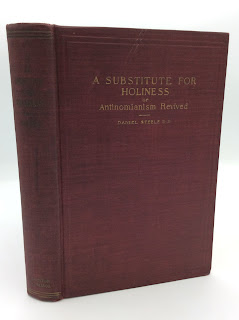"The power of God," says Fletcher, "is frequently talked of, but rarely felt, and too often cried down under the despicable name of frames and feelings."
"If I had a mind," said the eloquent George Whitefield, "to hinder the progress of the Gospel, and to establish the kingdom of darkness, I would go about telling people 'they might have the Spirit of God, and yet not feel it,' or which is much the same, that the pardon which Christ procured for them is already obtained by them, whether they enjoy the sense of it or not."
This is the kind of faith which multitudes of souls in utter spiritual barrenness are resting in for eternal life. They are exhorted to beware of looking for any changed feeling, that feeling is inconsistent with true faith.
Says John Wesley,
"It is easy to satisfy ourselves without being possessed of the holiness and happiness of the Gospel. It is easy to call these (holiness and happiness) frames and feelings, and then to oppose faith to one and Christ to the other. Frames (allowing the expression) are no other than heavenly tempers, the mind that was in Christ; feelings are the Divine consolations of the Holy Ghost shed abroad in the heart of him that truly believes. And wherever faith is, and wherever Christ is, there are these blessed frames and feelings. If they are not in us, it is a sure sign that though the wilderness become a pool, the pool is become a wilderness again." (Note on Peter iii. 18).
This is the process of inculcating this kind of faith: The religious teacher sits down in the inquiry room, by the side of the seeker, opens his Bible at Romans x. 9, and reads: "If thou shalt confess with thy mouth the Lord Jesus (Jesus as Lord, Rev. Ver.), and shalt believe in thy heart that God hath raised him from the dead, thou shalt be saved." Do you confess that Jesus is your Lord? Yes. Do you believe that He arose from the dead? Yes. Well, praise the Lord, you are born again! you have found eternal life. But I do not experience any inward change. Never mind that; you are to believe without any feeling. If you look for feeling as the ground of your faith that you are now a child of God, you dishonor the Word. The Word says that you are saved, and you ought to believe the Bible. It is weak and childish to be looking for any change in your feelings. I strongly advise you to be baptized and join the Church. You have fulfilled the conditions of salvation. You are henceforth to count yourself a Christian, and by a resolved will to crush out all doubts respecting your conversion, whenever they arise. For they will arise. All true Christians have doubts of this kind. It is an evidence that they have a good hope in Christ. But, dear pastor, is this all there is in the new birth? I expected I should have unspeakable joy, arising from a sense of burning love. I thought I should be sure that I was saved by some inward impression by the Holy Ghost. Oh, says the pastor, you are not to expect a miraculous conversion. That kind is limited to the Apostolic age.



No comments:
Post a Comment